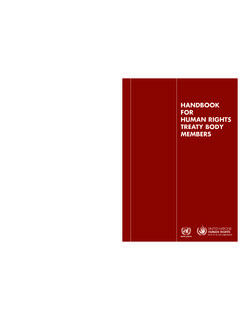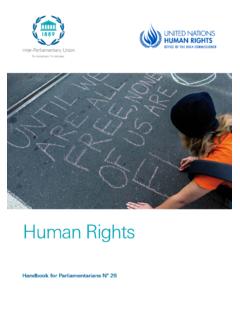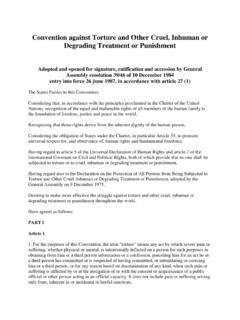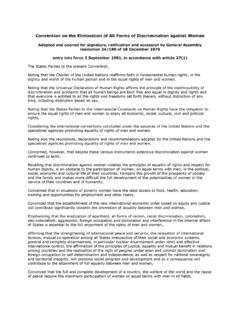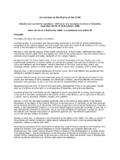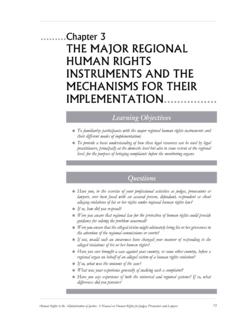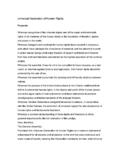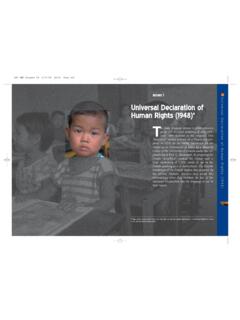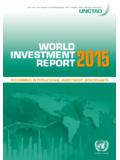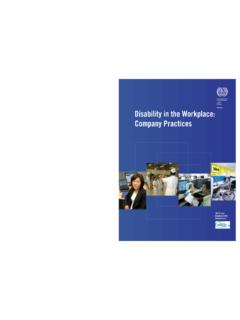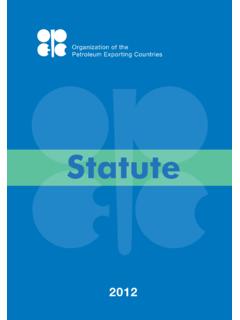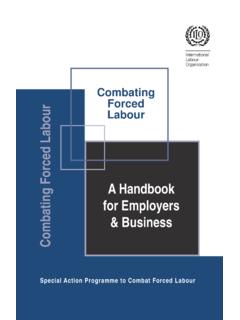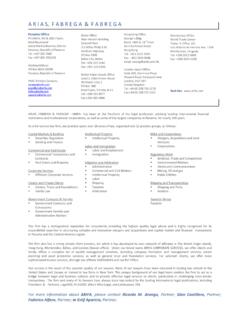Transcription of Women, Business and Human Rights - OHCHR
1 1 women , Business and Human Rights : A background paper for the UN Working Group on Discrimination Against women in Law and Practice by Ama Marston March 7, 2014 Acknowledgements Frances Raday, chairperson of the Working Group on the issue of discrimination against women in law and practice and Director of the Concord Research Centre for Integration of International Law, provided significant inputs and guidance in the framing of this paper and should be acknowledged for her important contributions. The author would also like to thank Jane Connors, Nathalie Stadelmann, Caroline Meenagh, Federica Donati and Narcisse Dongar of the UN Office of the High Commissioner for Human Rights for their comments and logistical support. Additionally, a number of experts who participated at the Workshop on Business and Gender, held by the Working Group on Discrimination against women in Law and Practice, Office of the UN High Commissioner for Human Rights in Geneva October 3, 2013, contributed their expertise.
2 This includes members of the Working Group on the Issue of discrimination in Law and Practice Kamala Chandrakirana, Emna Aouji, Patricia Olamendi Torres, Eleonora Zielinska. The author would also like to thank the following external experts: Cephas Luminas, UN Independent Expert on Foreign Debt; Jane Hodges, ILO; Githa Roelens, ILO; Shauna Olney, ILO; Margaret Jungk, member of the Working Group on the issue of Human Rights and Transnational Corporations and other Business Enterprises; Kathryn Dovey, Global Business Initiative on Human Rights and member of the Gender, Business and Human Rights Reference Group; Medha Dubhashi, Centre for Gender Studies; Meg Jones, women and Trade Programme of the International Trade Centre; Leah Hoctor, International Commission of Jurists; Elizabeth Jane Casbianca, UNCTAD s Trade, Gender and Development Section; Caroline Brenot, Geneva women in International Trade; Catherine Gambotto, Geneva women in International Trade; Aniela Unguresan, Gender Equality Project.
3 Mayra G mez, Global Initiative for Economic, Social and Cultural Rights ; and Lucy McKernan, Global Initiative for Economic, Social and Cultural Rights . Finally, a note of gratitude is extended to Business and Human Rights experts Andrea Shemberg of the Gender, Business and Human Rights Reference Group and Chris Jochnick, Lecturer at Harvard Law School in Business and Human Rights . 3 Table of Contents 1. Contextualising women , Business and Human Rights 5 2. Normative guidelines and social changes 7 CEDAW 7 ILO 8 Growing awareness 9 3. women as Business leaders, entrepreneurs and decision-makers 9 women s contribution to Business 10 The women s leadership gap 11 Barriers to women s entrepreneurship and Business opportunities 13 Legal frameworks for equality and quotas 14 Access to credit, financial services, training and opportunities 18 Cooperatives 22 Procurement and expanding opportunities 24 Expanded trade opportunities 25 4.
4 Corporate responsibility and the gender impact of corporate and trade practices 28 Changing approaches to Business and Human Rights 28 women , Business and Human Rights 29 Key sectors and areas of impact 31 Lack of access to justice 36 Insertion points and tools for women , Business and Human Rights 37 Examples to build upon 42 5. Conclusions 46 4 Executive Summary women make significant contributions to the effectiveness, profits and talent pools available to Business not to mention the overall contributions they make to economies. Furthermore, women s inclusion in governance and leadership positions within Business is critical given the ways in which the private sector creates jobs, produces growth and impacts economic, social, environmental and cultural aspects of life. There is growing awareness of the need to address women s equal access to Business leadership and entrepreneurship and the need to incorporate gender into corporation responsibility and evaluation of the impacts of the ways we do Business today.
5 As a result there are a number of positive examples of change at the state, multilateral, private sector and civil society levels exist within each of these. However, a significant amount of discrimination remains and continues to exclude women from economic governance and creates barriers for women as Business leaders, decision-makers and entrepreneurs. There are several existing international mechanisms in support of non-discrimination. However, the significant gap in opportunities for women is a reminder that we must put them to better use to repeal discriminatory laws, policies and practices. Among the greatest measures for addressing greater equality and opportunity for women in Business are the introduction of quotas for women s representation in leadership and decision-making positions as well as efforts to improve access to credit and financial resources and increase opportunities through cooperatives, procurement policy, access to Business networks and trade related opportunities.
6 While women have been excluded from the highest-ranking positions in Business , current Business models, often supported by international trade agreements, have also spurred a global search for cheap labour and Business environments with lax regulation. This has disproportionately impacted women workers in the lower echelons and women in communities where transnational corporations operate. Within the context of corporate responsibility and a global discussion around Business and Human Rights , a conversation is just beginning to emerge with respect to how it relates to women . This encompasses the challenges women face across a range of sectors from the garment industry to land intensive sectors such as the extractive industries. It also includes the unique experiences of women due to their reproductive roles, the feminisation of migration and women s vulnerability to sexual violence and trafficking.
7 Normative frameworks such as the UN Guiding Principles on Business and Human Rights , which have been widely endorsed by governments and companies around the world must now be put to practice with the inclusion of women not just as victims of Rights violations but as decision-makers and agents of change. In hand with Business leaders, multilateral agencies, governments and others in civil society women must be given an equal opportunity to shift the balance of the costs and benefits of Business . 5 Overview Sex-based discrimination against women remains a significant barrier for women in Business whether as entrepreneurs, Business leaders or decision-makers. In addition, women workers concentrated at the bottom of corporate value chains experience discrimination and the violation of Rights in unique ways. Furthermore, women shoulder a disproportionate burden of the impacts of businesses on the communities in which they operate, particularly when impacts specific to women are not incorporated into planning stages and consultations related their Business activities.
8 With this in mind, this paper examines remaining discriminatory legislation and other obstacles women face as Business leaders and entrepreneurs. It also highlights examples of existing initiatives that provide lessons that can be built upon to contribute to continued elimination of discrimination against women in Business . Furthermore, the paper examines the gender implications of the regulation of Business and transnational corporations in the international Human Rights context and evaluates the gender responsiveness in the formulation and implementation of principles for the private sector to respect Human Rights . Given the breadth of these issue and the time within which the paper was developed, it provides an overview but is by no means exhaustive. Section 1. provides context for the overlapping issues of women , Business and Human Rights . Section 2. addresses normative guidelines and social changes.
9 Section 3. looks at women as Business leaders, entrepreneurs and decision-makers, and Section 4. examines corporate responsibility and the gender impact of corporate and international trade practices. Section 5. provides conclusions of this research. 1. Contextualising women , Business and Human Rights Equality for women is first and foremost a matter of Human Rights . However, it expands the talent pool and resources available to Business and women s inclusion in economic governance and decision-making makes important economic contributions. Additionally, research shows that women 's income tend to correlate with greater expenditure on family welfare and children, (up to 90%) unlike similar increases in the income of men (38%).1 women s inclusion in governance and leadership positions within businesses is critical given the ways in which the private sector creates jobs, produces growth and influences and impacts economic, social, environmental and cultural aspects of life.
10 Business around the world has been growing as has the extent of the economies businesses command and the concentration of resources in a top echelon of decision-makers from which women are often excluded. Pressure to outcompete others in a global 1 International Trade Center. 2011. ITC Gender Mainstreaming Policy. Accessed on Nov 10, 2013. 6 market has also led larger businesses to outsource work to other parts of the world with inexpensive unskilled labour, among which women are concentrated in global value chains, and more flexible social and environmental regulation. The top 200 companies surpassed the combined economies of 182 countries as far back as a decade As a result many of these businesses have significant influence in political processes whether domestically or internationally, ranging from support for certain sectors of the economy to wages to environmental and social regulation and education, to name a few.
